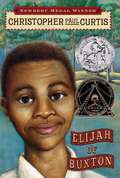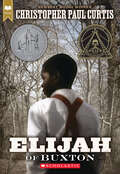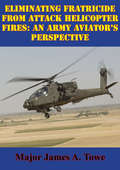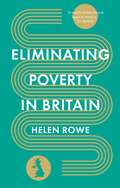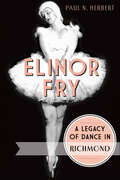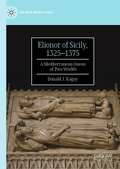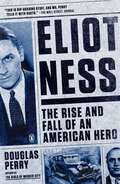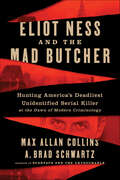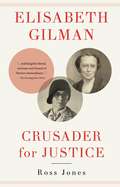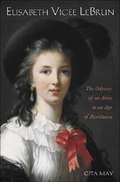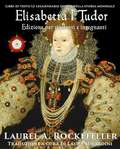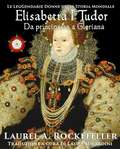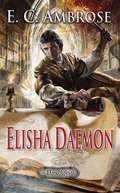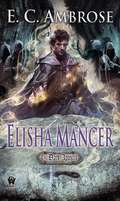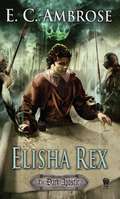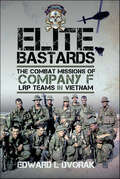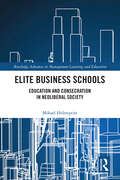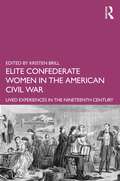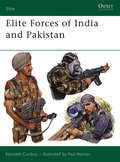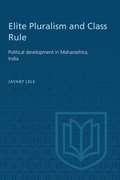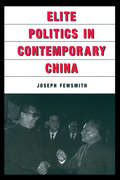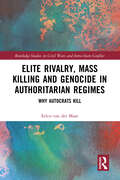- Table View
- List View
Elijah of Buxton
by Christopher Paul Curtis11-year-old Elijah is the first child born into freedom in Buxton, Canada, a settlement of runaway slaves just over the border from Detroit. Things change when a former slave steals money from Elijah's friend, who has been saving to buy his family out of slavery in the South. Elijah embarks on a dangerous journey to America in pursuit of the thief. <P><P> <b>A Newbery Honor book</b> <P><b>Winner of the Coretta Scott King Medal</b> <P><b> Winner of the Scott O'Dell Award for Historical Fiction </b>
Elijah of Buxton
by Christopher Paul CurtisMaster storyteller Christopher Paul Curtis's Newbery Honor novel, featuring his trademark humor, unique narrative voice, and new cover art--now in paperback!<P><P> Eleven-year-old Elijah lives in Buxton, Canada, a settlement of runaway slaves near the American border. He's the first child in town to be born free, and he ought to be famous just for that. Unfortunately, all that most people see is a "fra-gile" boy who's scared of snakes and talks too much. But everything changes when a former slave steals money from Elijah's friend, who has been saving to buy his family out of captivity in the South. Now it's up to Elijah to track down the thief--and his dangerous journey just might make a hero out of him, if only he can find the courage to get back home.<P> <i>Advisory: Bookshare has learned that this book offers only partial accessibility. We have kept it in the collection because it is useful for some of our members. To explore further access options with us, please contact us through the Book Quality link on the right sidebar. Benetech is actively working on projects to improve accessibility issues such as these. </i>
Eliminating Fratricide From Attack Helicopter Fires: An Army Aviator's Perspective
by Major James A. ToweIn the aftermath of the euphoria brought on by our military victory in the Persian Gulf War, is the realization that we still have much to learn. The Persian Gulf War appears to have validated the quality of U.S. doctrine, leadership and military prowess. It showcased the technical superiority of our equipment, and confirmed under fire the courage and competence of our soldiers, sailors, airmen, and marines. Yet, even in an overwhelming victory there are painfully hard lessons to be learned, or in the case of fratricide, relearned.Perhaps no other aspect of our failures strike the military psyche harder than fratricide. This study will suggest that we do not have to accept the fratricide statistics of the past, however factual, as inevitable of future U.S. conflicts. It will propose that the facts of fratricide should be gathered not as a casualty prediction planning tool, but as a focus to design training and operational procedures, which in conjunction with advanced technology will work towards the significant reduction if not the elimination of fratricide from attack helicopter fires.
Eliminating Poverty in Britain
by Helen RoweCan we really end poverty in Britain?Yes, we can.In this groundbreaking book, Helen Rowe brings together the latest research with stories from across Britain to show us that ending poverty in the twenty-first century is possible. She describes the effects of deprivation on our society, institutions, communities, families and individuals – down to their very DNA.By using a combination of compassion, focus and a plan, Rowe describes how we can end poverty in five years, without raising taxes. Her radical ideas are grounded in practical realities, as she reveals how ordinary processes can yield extraordinary results.This book has huge ramifications for Britain and every developed nation globally. It will force governments to face an issue that has been ignored for too long. After Covid-19, Brexit, war, austerity and the global financial crash, Britain deserves a more positive future. How do we create it? Eliminating Poverty in Britain has the answers.
Elinor Fry: A Legacy of Dance in Richmond
by Paul N. HerbertIn Richmond, no other name is more synonymous with dance than Elinor Fry. Helen Keller, Bill "Bojangles" Robinson and author Tom Wolfe were just some of the people with whom Fry connected in five decades of dance. From 1920 to 1970, Fry was involved, often accompanied by her beloved students, in nearly every major public event in the River City. Performing in an array of venues and photographed twice by "National Geographic," Fry was a blend of creativity and business savvy and a wonderful role model for thousands of children who learned dance in her studio. Join author and historian Paul Herbert as he celebrates Elinor Fry's spirit and exceptional achievements in the world of dance in Richmond.
Elionor of Sicily, 1325–1375: A Mediterranean Queen of Two Worlds (The New Middle Ages)
by Donald J. KagayElionor of Sicily, 1325–1375: A Mediterranean Queen’s Life of Family, Administration, Diplomacy, and War follows Elionor of Sicily, the third wife of the important Aragonese king, Pere III. Despite the limited amount of personal information about Elionor, the large number of Sicilian, Catalan, and Aragonese chronicles as well as the massive amount of notarial evidence drawn from eastern Spanish archives has allowed Donald Kagay to trace Elionor’s extremely active life roles as a wife and mother, a queen, a frustrated sovereign, a successful administrator, a supporter of royal war, a diplomat, a feudal lord, a fervent backer of several religious orders, and an energetic builder of royal sites. Drawing from the correspondence between the queen and her husband, official papers and communiques, and a vast array of notarial documents, the book casts light on the many phases of the queen’s life.
Eliot Ness
by Douglas PerryThe true story of Eliot Ness, the legendary lawman who led the Untouchables, took on Al Capone, and saved a city's soul Eliot Ness is famous for leading the Untouchables against the notorious mobster Al Capone. But it turns out that the legendary Prohibition Bureau squad's daring raids were only the beginning. Ness's true legacy reaches far beyond Big Al and Chicago. Eliot Ness follows the lawman through his days in Chicago and into his forgotten second act. As the public safety director of Cleveland, he achieved his greatest success: purging the city of corruption so deep that the mob and the police were often one and the same. And it was here, too, that he faced one of his greatest challenges: a brutal, serial killer known as the Torso Murderer, who terrorized the city for years. Eliot Ness presents the first complete picture of the real Eliot Ness. Both fearless and shockingly shy, he inspired courage and loyalty in men twice his age, forged law-enforcement innovations that are still with us today, and earned acclaim and scandal from both his professional and personal lives. Through it all, he believed unwaveringly in the integrity of law and the basic goodness of his fellow Americans.
Eliot Ness
by Douglas PerryThe story of Eliot Ness, the legendary lawman who led the Untouchables, took on Al Capone, and saved a city's soulAs leader of an unprecedented crime-busting squad, twenty-eight-year-old Eliot Ness won fame for taking on notorious mobster Al Capone. But the Untouchables' daring raids were only the beginning of Ness's unlikely story.This new biography grapples with the charismatic lawman's complicated, largely forgotten legacy. Perry chronicles Ness's days in Chicago as well as his spectacular second act in Cleveland, where he achieved his greatest success: purging the profoundly corrupt city and forging new practices that changed police work across the country. He also faced one of his greatest challenges: a mysterious serial killer known as the Torso Murderer. Capturing the first complete portrait of the real Eliot Ness, Perry brings to life an unorthodox man who believed in the integrity of law and the power of American justice.acclaim and scandal from both his professional and personal lives. Through it all, he believed unwaveringly in the integrity of law and the basic goodness of his fellow Americans.
Eliot Ness and the Mad Butcher: Hunting America's Deadliest Unidentified Serial Killer at the Dawn of Modern Criminology
by Max Allan Collins A. Brad Schwartz"The thrilling history of the torso murderer. The tale of the ‘Untouchable’ who got Al Capone but failed to solve his goriest case." —Dan Jones, The Sunday TimesIn the spirit of Devil in the White City comes a true detective tale of the highest standard: the haunting story of Eliot Ness's forgotten final case–his years-long hunt for "The Mad Butcher of Kingsbury Run," a serial killer who terrorized Cleveland through the Great Depression. “After helping to put Al Capone behind bars, lawman Eliot Ness came to Cleveland, where he did battle with a vicious killer. ... Even Ness was stumped trying to apprehend the ‘torso murderer’ responsible for a series of ghoulish killings. ... The authors have done Ness justice." —Wall Street JournalIn 1934, the nation’s most legendary crime-fighter–fresh from taking on the greatest gangster in American history–arrived in Cleveland, a corrupt and dangerous town about to host a world's fair. It was to be his coronation, as well as the city's. Instead, terror descended, as headless bodies started turning up. The young detective, already battling the mob and crooked cops, found his drive to transform American policing subverted by a menace largely unknown to law enforcement: a serial murderer.Eliot Ness's greatest case had begun. Now, Max Allan Collins and A. Brad Schwartz–the acclaimed writing team behind Scarface and the Untouchable–uncover this lost crime epic, delivering a gripping and unforgettable nonfiction account based on decades of groundbreaking research.Ness had risen to fame in 1931 for leading the “Untouchables,” which helped put Chicago’s Al Capone behind bars. As Cleveland's public safety director, in charge of the police and fire departments, Ness offered a radical new vision for better law enforcement. Crime-ridden and devastated by the Depression, Cleveland was preparing for a star-turn itself: in 1936, it would host the "Great Lakes Exposition," which would be visited by seven million people. Late in the summer of 1934, however, pieces of a woman’s body began washing up on the Lake Erie shore–first her ribs, then part of her backbone, then the lower half of her torso. The body count soon grew to five, then ten, then more, all dismembered in gruesome ways.As Ness zeroed in on a suspect–a doctor tied to a prominent political family–powerful forces thwarted his quest for justice. In this battle between a flawed hero and a twisted monster–by turns horror story, political drama, and detective thriller–Collins and Schwartz find an American tragedy, classic in structure, epic in scope.
Elisabeth Gilman: Crusader for Justice
by Ross JonesThis is the first biography of Elisabeth Gilman, a largely forgotten Marylander who was born to privilege in the nineteenth century but became an irrepressible force for social justice in the twentieth. As the second daughter of Daniel Coit Gilman, founding president of The Johns Hopkins University in Baltimore, Elisabeth was raised in well-to-do, influential circles. Privately educated by tutors, she eventually earned a bachelor's degree at Johns Hopkins. But unlike many who shared Elisabeth's elevated station, she was possessed of a restless and critical spirit. As a strong devotee of the Social Gospel, she campaigned on behalf of the poor, African- Americans, women, and laborers exposed to harsh conditions. After her father's death, Elisabeth joined the Socialist Party and was nominated as a candidate for governor of Maryland, United States senator, mayor of Baltimore, and even sheriff of Baltimore. Never married, Elisabeth fell under the spell of a charismatic, progressive Episcopal priest named Mercer Green Johnston, and followed him and his wife to Paris during World War I, where she helped to support homesick American doughboys under the aegis of the YMCA.
Elisabeth Vigée Le Brun: The Odyssey of an Artist in an Age of Revolution
by Gita MayThe foremost woman artist of her age, Elisabeth Vigée Le Brun (1755-1842) exerted her considerable charm to become the friend, and then official portraitist, of Marie Antoinette. Though profitable, this role made Vigée Le Brun a public and controversial figure, and in 1789 it precipitated her exile. In a Europe torn by strife and revolution, she nevertheless managed to thrive as an independent, self-supporting artist, doggedly setting up studios in Rome, Naples, Venice, Milan, Vienna, St. Petersburg, and London. Long overlooked or dismissed, Vigée Le Brun's portraits now hang in the Louvre, in a room of their own, as well as in all leading art museums of the world. This gripping biography tells the story of a singularly gifted and high-spirited woman during the revolutionary era and explores the development and significance of her art. The book also recounts the public and private lives of Elisabeth Vigée Le Brun, connecting her with such personalities of her age as Catherine the Great, Napoleon, and Benjamin Franklin, and setting her experiences in the context of contemporary European politics and culture. A generous selection of illustrations, including sixteen of Vigée Le Brun's portraits presented in full color, completes this exceptional volume.
Elisabeth of Bohemia (Women in the History of Philosophy and Sciences #9)
by Sarah Hutton Sabrina EbbersmeyerThis book showcases Elisabeth of Bohemia, Princess Palatine (1618-1680), one of the foremost female minds of the 17th century. Best known today for her important correspondence with the philosopher René Descartes, Elisabeth was famous in her own time for her learning, philosophical acumen, and mathematical brilliance. She was also well-connected in the seventeenth-century intellectual circles. Elisabeth’s status as a woman philosopher is emblematic of both the possibilities and limitations of women's participation in the republic of letters and of their subsequent fate in history. Few sources containing her own views survive, and until recently there has been no work on Elisabeth as a thinker in her own right. This volume brings together an international team of scholars to discuss her work from a cross-disciplinary perspective on the occasion of her fourth centenary. It is the first collection of essays to examine a range of her interests and to discuss them in relation to her historical context. The studies presented here discuss her educational background, her friendships and contacts, her interest in politics, religion, and astronomy, as well as her views on politics, her moral philosophy and her engagement with Cartesianism. The volume will appeal to historians of philosophy, historians of political thought, philosophers, feminists and seventeenth-century historians.
Elisabetta I Tudor: Edizione per studenti e insegnanti (Libri di testo Le leggendarie donne della storia mondiale #4)
by Laurel A. RockefellerLa regina Elisabetta I è forse la sovrana più celebre e leggendaria della storia inglese. La conoscete davvero bene come credete? In questa biografia narrata scoprirete il passaggio da “Lady Elisabetta” a “Gloriana” attraverso il suo tumultuoso rapporto con Robert Dudley. Quando politica e religione si scontrano, Elisabetta si rifugia nella musica; decisioni importanti la aspettano mentre i complotti contro la sua vita minacciano il suo trono. Nel percorso verso Gloriana scoprirete un lato inedito di Elisabetta. L’edizione per studenti e insegnanti include domande alla fine di ogni capitolo, così come appendici contenenti sei canti medievali ed elisabettiani, una cronologia dettagliata e letture consigliate. Questo libro è il proseguimento di "Maria Stuarda, regina di Scozia".
Elisabetta I Tudor: da principessa a Gloriana
by Laurel A. Rockefeller Traduzione a cura di Laura Lucardini“Senza alcuna prova, io vengo, per mano del vostro Consiglio, da voi condannata alla reclusione nella Torre, un luogo più adatto a un bugiardo traditore che a un suddito onesto. So di non meritarlo, tuttavia l’intero regno pare ormai convinto che ciò accadrà", scrisse la pricipessa Elisabetta Tudor alla sorella regina Maria, mentre le guardie erano pronte a portarla alle prigioni della Torre di Londra. La regina Elisabetta è forse la sovrana più leggendaria e famosa della storia inglese. Ma la conoscete davvero bene? In questa bellissima biografia narrativa, esplorerete il percorso da "Lady Elisabetta" a "Gloriana" attraverso la sua relazione con Robert Dudley, una relazione molto più controversa di quanto si creda. Nella collisione tra politica e religione, Elisabetta trova rifugio nella musica, mentre decisioni difficili la aspettano e continue congiure minacciano il suo trono. Accompagnate Elisabetta nel suo viaggio verso Gloriana per scoprire un lato di lei che non conoscevate. Il libro contiene sei canzoni medievali ed elisabettiane, una cronologia dettagliata e un elenco di letture consigliate. Il libro è il proseguimento di "Maria Stuarda, Regina di Scozia".
Elisha Daemon: Book Five of The Dark Apostle (The Dark Apostle #5)
by E. C. AmbroseIn this fifth and final installment of The Dark Apostle, barber-surgeon-turned-sorcerer Elisha must save plague-stricken England from its path of destruction--or risk succumbing to the very dark magic he is trying to eradicate.Elisha was once a lowly barber-surgeon from the poorest streets of 14th-century London; now, he may be the most powerful magus alive. He faces the necromancers, a shadowy cult of magi who draw their power from fear and murder--and who have just unleashed the greatest plague the world has ever known upon a continent already destabilized by wars, assassinations, and religious conflict. Empires and armies are helpless with no clear enemy to fight. The Church loses its hold upon the faithful as prayers go unanswered. Europe has become a bottomless well of terror and death, from which the necromancers drink deep as the citizens sink into despair. Elisha knows that if there is to be any chance of survival, he must root out the truth of the pestilence at its unexpected source: the great medical school at Salerno. There, Elisha might uncover the knowledge to heal his world.But as he does, his former mentor, the beautiful witch Brigit, lays her own plans. For there may be one thing upon the face of the planet deadlier than the plague: the unfiltered power of Death within Elisha himself.
Elisha Mancer (The Dark Apostle #4)
by E. C. AmbroseE.C. Ambrose's gritty, sharp historical fantasy series, The Dark Apostle, follows Elisha Barber through a magical reimagining of 14th-century EnglandElisha was once a skilled barber-surgeon, but healing is no longer his finest art. After discovering his exceptional potential for a singularly deadly magic, Elisha has slain a king, stopped a war, and even had the regency thrust upon his own commoner’s head until he could rescue the true heir, Thomas. With Thomas back on the throne of England, Elisha must now work on his king’s behalf to fight an even greater threat than civil war: the specter of the necromancers, a shadowy cabal that has already corrupted priests and princes, and that may have even grander, darker plans. Elisha travels to the continent to warn England’s allies of the mancer threat, as well as to discover the full extent of the mancers’ plans. But it soon becomes clear that if he is to have any hope of stopping those plans from coming to fruition, he must forge new alliances in unexpected places—as well as embrace the terrifying magical abilities in his possession, a move he fears will make him into just the kind of man he strives against.
Elisha Rex (The Dark Apostle #3)
by E. C. AmbroseElisha Rex is the third book in the gritty, sharp historical fantasy series, The Dark Apostle. Elisha was a skillful barber-surgeon, cutting hair and stitching wounds for poor peasants like himself in 14th century London. But that was before catastrophe ruined his family. Before he was falsely accused of murder, and sent to die in an unjust war. Before he discovered his exceptional potential for a singularly deadly magic, and was forced to embrace his gifts and end that war...by using his newfound abilities to kill the tyrannical king. Elisha is no longer the lowly barber he was, but it is hard to tell exactly who he is now. The beautiful witch Brigit, his former mentor, claims him for the magi, all those who have grasped the secrets of affinity and knowledge to manipulate mind and matter, and who are persecuted for it. Duke Randall, the man who first rose against the mad King Hugh, has accepted him as a comrade and ally in the perilous schemes of the nobility. Somehow, he has even become a friend to Thomas, both the rightful king and, something rarer, a good man. But he is still a regicide, and in order to solidify Thomas's authority among the restive barons, he had to let the new king sentence him to a horrific public execution. With Thomas's covert aid, Elisha faked his death and went into hiding, but the peasants of London are beginning to call it a martyrdom, as legends of Elisha's spectacular "miracles" in the service of his country have spread. Yet Elisha is finally beginning to understand the dreadful power within him, and he has never felt less holy--or more terrified. Because there is another force at work in the world, a shadowy cabal beyond the might of kings and nobles, that sees its opportunity in the chaos of war and political turmoil--and sees its mirror in Elisha's indivisible connection with Death. For these necromancers, Elisha is the ultimate prize, and the perfect tool. When the necromancers' secret plans begin to bear black fruit, England teeters on the brink of a hellish anarchy that could make the previous war look like a pleasant memory, and it appears Elisha is the only man who can stop it. But if he steps forward and takes on the authority he is offered to save his nation once again, is he playing right into the mancers' hands? Why does it seem like his enemies are the ones most keen to call him Elisha Rex?From the Paperback edition.
Elite Bastards: The Combat Missions of Company F, LRP Teams in Vietnam
by Edward L. DvorakThe quintessential first-person combat memoir of a special forces soldier fighting in the jungles of Vietnam. This is the quintessential first-person combat memoir of a special forces soldier at war. Edward Dvorak joined the 173rd Airborne Brigade in Vietnam in the summer of 1967. He then joined Company F, 51st Infantry, Long Range Patrol, Airborne. For Dvorak and his buddies of Company F, LRP, their real training started with the MACV (Military Assistant Command Vietnam) Recondo School at the 5th Special Forces Compound in Nha Trang, South Vietnam. That training culminated with an actual Combat LRP mission. If you lived through the patrol, you graduated. Dvorak would remain with Company F for 19 months going on dozens of combat patrols deep behind enemy lines.
Elite Business Schools: Education and Consecration in Neoliberal Society (Routledge Advances in Management Learning and Education)
by Mikael HolmqvistSocial scientists are paying increasing attention to the business and financial elites: There’s a great need to understand who these elites are, what they do, and what makes them tick, as individuals but also as a class. By examining elite business schools, the institutions that train and prepare people to assume important leadership and decision-making positions in business, finance and related sectors, we may also learn how the economic elites are made. A key argument in this book is that elite schools are known to create powerful groups in society, offering them the intellectual and analytical means to act as leaders, but, most importantly, the social, moral and aesthetic skills that are deemed necessary to exercise power; in all essential respects elite schools consecrate people. By dominating much of higher education today, and by doing so in a way that creates and reproduces a market-based organization and control of society, elite business schools represent certain interests and ideologies that affect the lives of most people. In understanding how the modern economy is run, elite business schools, therefore, represent critical study objects. This book, based on an in-depth study of the Stockholm School of Economics (SSE), offers a sociological analysis of the world of elite business schools. Specifically, this book examines the consecration of SSE’s students from a number of perspectives and in a number of situations, focusing on student union activities, school culture, faculty behavior, teaching, courses and alumni events, noting the symbolic importance of economics and particularly the school’s unique relation among the world’s business schools to the Nobel Prize. The book addresses the topics with regards to the sociology of elites, management education and organizational studies and will be of interest to researchers, academics, and students also interested in business history, higher education studies, and sociology of education.
Elite Confederate Women in the American Civil War: Lived Experiences in the Nineteenth Century
by Kristen BrillElite Confederate Women in the American Civil War is a wide-ranging primary source collection that offers a compelling selection of upper-class, white Confederate women’s voices from archives across the South. From the prison diary of Mary Terry to Elizabeth Baker Crozier’s eyewitness account of the siege of Knoxville, this volume introduces lesser-known voices of the war to show the interconnections between the home front and the front lines, and how the war shaped the lives of women and households across the South. This collection challenges students to engage with the role of first-person narratives in history and to reconsider the roles of southern women in the Civil War. Exploring the themes of slavery, nationalism, secession and occupation, these narratives offer new ways to think about traditional issues in Civil War history and, more broadly, show the ways in which studies of women and gender can enrich studies of cultures of war. This book is designed for undergraduate and graduate students of both the American Civil War and women’s history.
Elite Forces Selection (Special Forces: Protecting, Building, Te)
by Jack MontanaElite forces only want the best men in their ranks. That is why their selection courses are the toughest in the world. Only one out of every four recruits to the United States Army Rangers, for instance, make it through all phases of their training. Elite Forces Selection takes you into the heart of special unit training, and shows you what you need to do to pass. Fitness and preparation come first; then you have to face everything from brutal speed marches to the underwater tests of the U.S. Navy SEALs. The selection courses of individual units are examined, revealing: * How the Navy SEALs train themselves to prevent drowning. * How the Special Forces become medical experts. * How you can control your mind in order to succeed.
Elite Forces of India and Pakistan
by Kenneth Conboy Paul HannonInfluenced by the German use of paratroopers early in World War II (1939-1945), General Sir Robert Cassels, the Commander-in-Chief India, ordered the formation of an airborne cadre in October 1940. Thus marked the origins of India's first élite units. Pakistan can trace the origins of its own army airborne to the common parentage of British-raised forces. Following the partition from India in August 1947, it raised its own Special Service Group, with individually specialised companies including desert, mountain, ranger and underwater warfare units. This remarkable volume by Kenneth Conboy details the history, organisation, uniforms and insignia of the élite forces of India and Pakistan. Also covered are the elite forces of Afghanistan, Nepal, Sri Lanka, and Bangladesh.
Elite Pluralism and Class Rule: Political development in Maharashtra, India (The Royal Society of Canada Special Publications)
by Jayant LeleBased on a study of recent political behaviour in a rural region of India, the author presents a critique of pluralist theories of democracy and advances a new approach to political sociology. Professor Lele insists that the politicians of Maharashtra sustain, however dispersed, a hegemonic class rule. The processes of development and modernization directly serve strategies of private gain through the public sphere; the elites continue to enclose the public sphere while propagating the myth of open competition. Case studies of local, state, and national politicans illustrate this behaviour and show how competition between powerful alliances is effectively moderated. The concluding section proposes a new comparative approach to political sociology. It demonstrates the inherent contradiction between domination and community, and argues for a historical analysis of the rise and fall of classes and ideologies. Professor Lele challenges the emphasis on modernization and instrumentality in contemporary social science, and suggests that the insights of Marx and Weber can lead to a more previse and universal framework for the study of societies.
Elite Politics in Contemporary China
by Joseph FewsmithA discussion of elite politics in contemporary China. While a great deal of the text is descriptive, much of the emphasis is on drawing out and abstracting the political dynamic at work.
Elite Rivalry, Mass Killing and Genocide in Authoritarian Regimes: Why Autocrats Kill (Routledge Studies in Civil Wars and Intra-State Conflict)
by Eelco van der MaatThis book explains how mass killing is driven by elite politics within authoritarian regimes.Mass killing and genocide defy reason and explanation. How can genocidal elites present defenceless victims as an existential threat? Why use indiscriminate killing that drives victims to coordinated resistance? Mass killing seems counterproductive, irrational, and therefore inherently ideological. By building on new insights on authoritarian politics, this book argues that mass killing is not ideological, but instead is a rational response to elite rivalry within authoritarian regimes. Mass killing is therefore not driven by rivalries between groups, but by elite rivalry within groups. In Rwanda, for example, the genocide was not driven by conflicts between Hutu and Tutsi, but by conflicts within the Hutu regime. The work demonstrates how mass killing helps elites build coalitions with groups that benefit from violence and how it divides support coalitions of rival elites. Mass killing can therefore help elites win dangerous internal rivalries. By qualitatively and quantitatively exploring elite rivalry and mass killing, this book provides a new explanation for a host of mass killings and genocides. It demonstrates that well-known genocides, such as the Rwandan and Cambodian genocides, which are seemingly ideological are instead better explained by elite rivalry. Mass killing is therefore not driven by the random madness of leaders, nor by the desire to kill an outgroup, but by the internal threats that authoritarian elites face.This book will be of much interest to scholars and students of civil wars, genocide, political violence, and International Relations in general.
